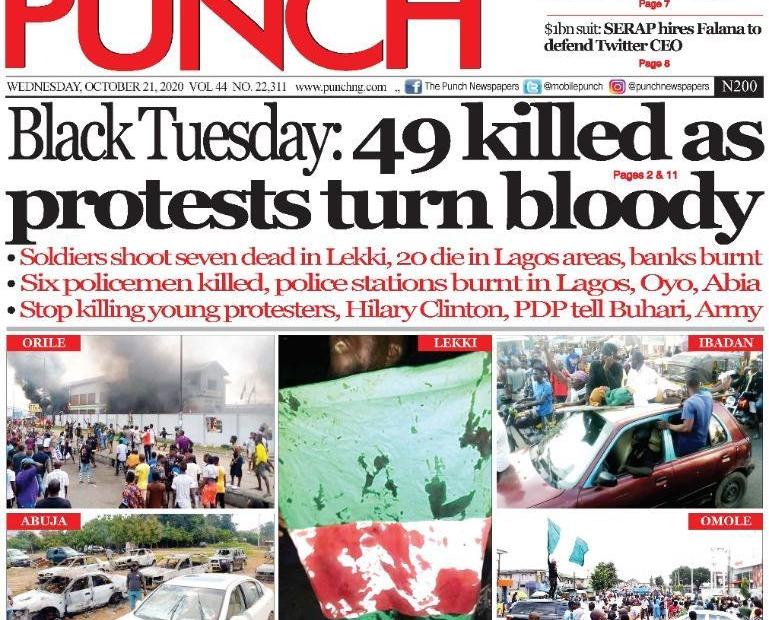By Adagbo Onoja
A debate no one has declared is already raging within and outside Nigeria. It is about whether the media exercised sufficient caution in reporting the now contested shooting at Lekki Toll Gate on October 20th, 2020. It would be a great relief if the Nigerian security establishment is exonerated at the end of the day. That would show it has transcended that brutal manner of clearing protesters, complicity in which would have completely questioned the reported rise in the individual and collective intellectual profile of members of that establishment. There can be no enough compensation though for the tension many suffered that night contemplating the horror of a nation’s military taking direct aim at such a crowd. May it happen at the end of the day that the army can reclaim the confidence that makes ordinary Nigerians to run to the barracks in moments of tension in the complete sense of safety in doing so. It is something the Army has probably not played up enough.
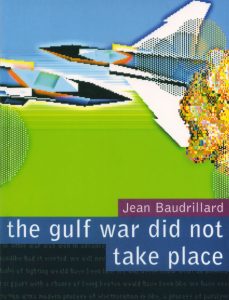
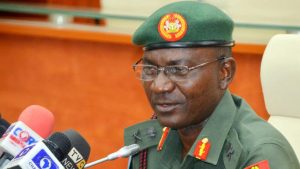
Major-General John Enenche, Defense spokesperson, says that with Lagos State Government probing the violence, he could no longer be categorical on whether the military did the shooting or some provocateurs simulated a spectacle
If the military is exonerated, meaning that the media failed it, then something like a badge of recklessness would become the media’s baggage. Ordinarily, that should be a serious indictment. But, to hold such to be the case if no shooting took place or if it was not by the military would be to ignore the space and time context of contemporary newsreporting. No scholar or practitioner has done a better job in framing that context than French philosopher, Jean Baudrillard, in his 1991 newspaper articles which eventually morphed into a book under the title The Gulf War Did Not Take Place.
Of course, both the first and the second Gulf War took place. Troops clashed, people died in thousands and there were all the horrors of war. What Baudrillard is saying is how much of the war we all saw were what the 24 hour global television channels determined for us. And much of that were military technologies that we were told were so intelligent or so smart as to be able to distinguish between human and non-human beings and decide which to destroy. Hence the concept of ‘clean’ war or Virtuous War, the narrative that suggested that the two wars were about wonderful, considerate war machines that did not take human lives carelessly. You may call it propaganda which is what it should be called but it is also the story of a turning point whereby information/surveillance technology has reached a level where it can merge the real and the fake/unreal into a spectacle as to make those who get to represent conflict or war or violence to determine what the violence is all about.
That is what Professor James Der Derian, the leading authority on this subject, was referring to in saying that “Digitized, interactive, networked forms of communication now exercise a global presence: instant video-feeds, satellite link-ups, TI-T3 links, overhead surveillance, global mapping, distributed computer profiling, programmed
trading, and movies with Arnold Schwarzenegger make up some of the most visible forms. Virtualization represents the most penetrating and sharpest-to the point of invisibility-edge of globalization. The power of virtuality lies in
its ability to collapse distance, between here and there, near and far, fact and fiction. And so far, it has only widened the distance between those who have and those who have not”
The above quotation from his more powerful Virtuous War/Virtual theory essay draws attention to what he also calls the technological and representational practice of power with intent to discipline, deter and compel. In his own words, “using networked information and virtual technologies to bring ‘there’ here in near-real time and with near-verisimilitude, virtuous war exercises a comparative as well as strategic advantage for the digitally advanced”. The point is thus that we are at a moment in human history when networked information and virtual technologies can operate as what that scholar also calls ‘false multipliers’, thereby enabling the packaging of violence in particular in a manner that anyone can hardly notice any difference between the real and the unreal. It enables killing and presenting same as an entertainment or not even presenting it at all.
From that analysis, Der Derian came up with expanding the notion of Military-Industrial – Complex, (MIC) to Military-Industrial-Media-Entertainment Complex, (MICEC) – the successful instrumentalisation of information technology to promote the militaristic orientation of the original MIC which President Eisenhower warned the United States of America against in his farewell address in 1961. That merger of information technology with military or war processes is what constitutes the Revolution in Military Affairs, (RMA) in critical security studies or critical military studies.
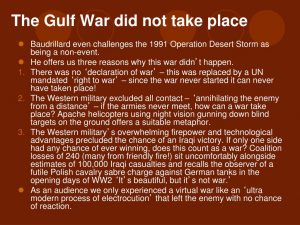
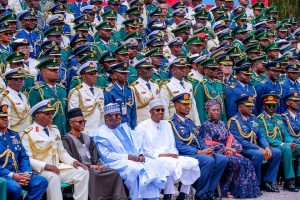
C-in-C amidst the top brass of the military
Baudrillard’s The Gulf War Did Not Take Place is his application of the emergence of digital narrativisation as power in the first Gulf War. That level of the simulation of violence doesn’t happen every other day but smaller levels of violence are happening here and there and in which he who gets to represent them determines what is real or unreal about them.
If the military is exonerated from Lekki shooting, it would mean that some actors with idea of the projection of power through simulation of a spectacle organised the shooting in a way no national media can fail to fall for it. The weaponry available to a conventional military when compared to some protesters is so disproportionate that the idea of such a shooting is in itself the story to beat. And then a spectacle coming at that hour of the evening when print media editors are scratching their heads for a good enough front page lead the next day at a time the online newspapers have shown a capacity to steal the thunder. Even the most intelligent, facts-checking editor would fall for it with minimum caution, especially that the situation prior to the shooting was a perfect condition of possibility.
The foregone is to say that the paradigm of simulation of spectacle courtesy of MICEC and the very situation preceding the ‘shooting’ exonerates the Nigerian media and, instead, throws the challenge back at a clumsy Nigerian State. The gathering of that number of citizens in one spot such as that of the protesters at Lekki Toll Gate made that ground a zone that should have been on the security radar 25 hours a day. It meant not only the security of the protesters from state action but even more so from spoilers, anarchists or any variant of agent-provocateurs. In other words, no set of people, whether we call them miscreants or hoodlums, should have been able to penetrate and stage any spectacle in that place as to even bring about the question of how well or otherwise the media reported such.
Welcome to informationalised capitalism and its diffusion of class conflict with digital visualisation of today. Ignorance of it or reluctance to acknowledge that reality or deliberate autonomisation of a presidential claim of media misinformation in the current crisis is simply bad statecraft. What intelligent governments do is to be on the ready with counter-narratives that are discursively strong enough to overwhelm the promoters of narratives and practices considered subversive. In his last broadcast Thursday, President Buhari failed this test. Instead of an alluring narrative, he took the path of a threat-defense dialectic, an alienating Realism that some forces and interests were selling break-up narratives and associated practices and have to be stood up to. He got it wrong two major grounds.
There are millions of Nigerians who do not accept breaking up Nigeria. They are everywhere – North, East, South, West, Central. They cannot imagine themselves in a Nigeria that is smaller than what already exists even as they might reckon with a painful experience in nation building that Nigeria has been. They stick to the idea of Nigeria because they know that otherwise, they will become bystanders in global affairs because breaking Nigeria will be much harder than separating water into component elements. Breaking Nigeria cannot happen without violence of imponderable magnitude. Breaking a nation is a very complicated process, not to talk of breaking a Nigeria. Those who fit into this category do not need any lectures on the imperative of preserving Nigeria.
There are a few others who still have difficulty in coming to terms with the idea of Nigeria being one country either because of the tune their patrons might be dictating or because they cannot outgrow an idea that has been overtaken. Even those very few ones who are still not very successful in selling their position in any serious quarters can be won over and should be won over. Doing so is not cowardice but bringing everyone to the same page on the strategic salience of Nigeria for the Black world. The kind of Realism and the associated but unwarranted stiffness or is it toughness? the president displays in handling issues such as the current #EndSARS crisis injures this process. This is more so that the president has no consistency in this stiffness. When he desperately wanted to win the election for the second term, he invited the so-called leaders of NANS to the Villa. Angry youths on the streets for over ten days could not be demobilized through presidential populism. How come?
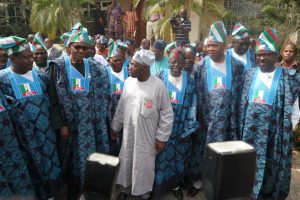
A memorable picture of the ‘coalition’ in 2015 but where is that today?
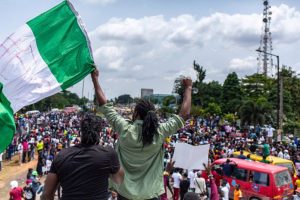
There is no symbol of nationhood more powerful than this
The second is the falsehood of the narrative of subversion from which President Buhari is supposed to be protecting Nigeria and Nigerians from. An administration which has been in a hot romance with the IMF and the World Bank in the most slavish manner cannot be selling this kind of claim. The Buhari promise as a patriot who would resist these international financial institutions has turned out an empty casket. Of course, Nigeria has potentials to be a global player. To that extent, it is inherently an object of mischievous power calculations. But a Buhari is not a Gaddafi. And if ‘they’ have such intention, it is the same Buhari who has invited them by his neoliberal turn. Why complain now? in this context, those who are saying that the charge of subversives at work is a strategy of diverting attention from his own contributions to the very conditions for the uprising, especially as pointed by Col. Dangiwa Umar just a few months back to the effect that Buhari leadership and power could be inviting of this sort of situation. Did the president listen?
And if it is true a Syrian scenario is on the table as some social media stuff are suggesting, why allow the promoters of such trajectory to set the agenda for you and the country? Why not even deny them such recognition and turn the tide against them? It could have been the easiest thing to do, given the completely patriotic tone and practices brought on board by the protesting youths. Nothing but unwarranted stiffness and insular fixations stopped the president from seizing the high ground by converting the banal nationalism that flowed in the protesters’ allegiance to the flag and the National Anthem. After all, threats are what one makes of them. The tragedy is that this was not done in such a way as to add value to what the youths were saying. Instead of adding value, the idealism of the youth was wrecked and brought to pedestrian levels by the deliberate marketing of it as a regional attack on the sitting government. It is unbelievable. No one is surprised that such responses have contributed to the dispersal of the sites of the protests that we are witnessing now. It is hoped that a hurried assembling of former Heads of State can quickly move to douse tension and restore normalcy.
When we consider the reality of simulation and spectacle on the one hand and the government’s mismanagement of what should have been a healing moment for a nation, it is easy to dismiss as unwarranted the creeping apologetic sense in the public sphere in general and in the media in particular.
The great point is how, all said and done, the youth have still won the argument. They have made a point in summarizing the last 60 years and setting the agenda for the next 100 years, especially 2023. They have done this in spite of sections of the national community pretending that they do not know that hierarchical leadership is not a strong feature of new social movement politics in the post Cold War. Instead, theirs is politics of bytes, hastags, phrases, metaphors, images and narratives rather than formal position of president, chairman, secretary-general or patrons. It is a fluid succession of models, First Ladies, writers, actresses, philanthropists, clerics, ideologues and sundry actors. It is in this fluidity of the politics of new movements that #EndSARS also came with painful consequences for many. But the lesson for everyone is that it is dangerous to imagine that the majority do not matter because they do not have coercive power. The 21st century has shown that the type of power they need is available to them as far as emancipation is concerned. It is the power that comes from the management of meaning. Otherwise known as discursive power, it is superior to the Realism of the ancien regime.
Onoja, the author, is an Editorial Associate of Intervention

